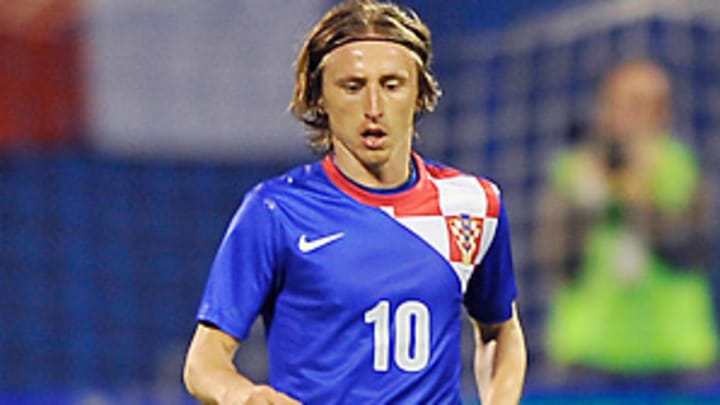Euro 2012 Preview: Croatia


Croatia's love affair with coach Slaven Bilic is heading for a messy divorce. After reaching the Euro 2008 quarterfinals, it failed to make the World Cup and endured a difficult qualification campaign until an impressive 3-0 win over Turkey and Guus Hiddink in the playoffs. Bilic already confirmed he will leave after the tournament -- he signed a contract with Lokomotiv Moscow -- but he is desperate to go out on a high and prove his critics wrong.
Bilic was mocked when he talked up Croatia's chances in Group C and even suggested his team is good enough to win the tournament. But he was backed up by his players, with whom he has forged an "us-against-the-world" siege mentality. The players love and respect Bilic and want to do well for him.
Can they do it? Well, Croatia has the talent on any given day to beat anyone. The win over Turkey was arguably the best performance in Bilic's six-year reign. Its attacking players are as good as anyone's in the tournament, but there are concerns about the defense, which could do with someone like Bilic himself to hold it together.
Luka Modric
At Dinamo Zagreb, Modric played as a No. 10 almost a second striker, until Bilic moved him into central midfield, and even further back after Niko Kovac retired. Modric starts even deeper for Croatia than he does for Tottenham Hotspur but is encouraged to move upfield and be more of a box-to-box midfielder. It's a different role for him, and he is on an individual fitness program to get into shape for it.
Nikica Jelavic
Ivica Olic has been Bilic's first-choice center forward the last two years, but Jelavic's recent form at Everton is impossible to ignore.
Although Jelavic is more of an old-fashioned No. 9, without the energy and superb defensive work of Olic, Bilic said he doesn't need to change the system to suit the forward. Instead, he backed Jelavic to score more goals because the quality of crosses will be better than he gets at Everton:
"His form is one of the main reasons for my optimism," Bilic said. "He's bursting with strength, confidence and health, so I'm happy we have him."
Darijo Srna
The captain has struggled with the intensity of representing Croatia and admitted that losing to Turkey on penalties at Euro 2008 hit him hard (he was the only Croatian to score from the spot). But he remains one of the best dead-ball specialists in the game and has been pushed from right back into right midfield to provide more attacking thrust. He does have an eye for the big occasion, having scored goals at the 2006 World Cup and at Euro 2008. He also set up Shakhtar Donetsk's winner in the 2009 UEFA Cup final.
How will the Bilic story end?
Bilic has made no secret of his frustration with the Croatian media. He upstaged his own squad announcement by confirming he was moving to Moscow, and already the local press is looking to the next man in charge, expected to be Igor Stimac. The players are determined to do well for Bilic, but support from fans and the media will be harder to come by.
Will Croatia's defense let it down?
Croatia has problems at center back with Dejan Lovren an injury doubt and Josip Simunic out of form. So Bilic may take a risk and play Vedran Corluka, a right back who was outstanding at left back in the win over Turkey, in the center. That will leave Domagoj Vida on the right and Ivan Strinic, who is good going forward but less so in defense, on the left. No position across the back line is yet sorted, and how Bilic fixes it could determine Croatia's campaign.
The diversity debate
The key strength of Croatia's legendary team of 1998, third at the World Cup, was its unity. Here was a new, small nation looking to establish a distinct identity, and its footballers helped do that. Fourteen years on, this Croatia side may have the same checked shirts and play an attacking game, but this is a much more diverse group. Srna, the captain, comes from a Bosnian Muslim background; Corluka, Lovren and Jelavic were all born in Bosnia, Ivan Rakitic and Mladen Petric in Switzerland, Ivo Ilicevic in Germany, Simunic in Australia and Eduardo da Silva in Brazil. While host nation Poland is divided on the players who have taken up nationality to play for it, there is no such problem in Croatia. You wear the shirt, you defend the colors. Simple.
Croatia fields a 4-4-1-1 formation, but how well the team works often depends on where Modric plays. His role this month will be part deep-lying playmaker and part box-to-box midfielder. Mario Mandzukic plays just behind the main striker, who could be Jelavic and not Olic. Bilic may sign off his reign with two crucial positional changes; moving Srna to right midfield makes more use of his crossing skills while Corluka, after playing in both fullback positions, may have to fill in at center back.
